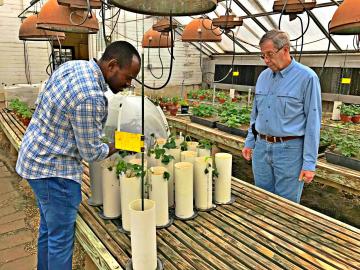The African Union Commission/United States Department of Agriculture Scientific Exchanges Program 2021 is now open for applications.
Table of Contents
When is Application Deadline for Scientific Exchanges Program?
10th October 2021
Tell me about Scientific Exchanges Program:
The African Union Sanitary and Phytosanitary (SPS) Policy Framework aims to facilitate harmonization of AU Member States’ SPS policy priorities of SPS systems in Africa. The policy framework addresses diverse and intersecting needs with the objective to; establish harmonized science-based SPS systems; strengthen collaboration and trade facilitation; build technical capacity and; increase political support and public and private sector investment in SPS systems.
The Scientific Exchanges Program (SEP) supports USDA’s agricultural research goals of promoting collaborative programs among agricultural professionals of eligible countries, agricultural professionals of the United States, the international agricultural research system, and U.S. entities conducting research. SEP is implemented by USDA’s Foreign Agricultural Service, Global Programs, Fellowship Programs.
The SEP Fellowships in general was created to operationalize the joint effort of the AU and USDA to promote food security and economic growth in eligible countries by educating a new generation of agricultural scientists, increasing scientific knowledge and collaborative research to improve agricultural productivity, and extending that knowledge to users and intermediaries in the marketplace. The collaborative nature of the SEP training and research programs benefits the fellow, his or her home institution, and partner country; the U.S. host institution, its professors, researchers, and students; and the global agricultural sector by improving agricultural productivity, systems, and processes in partnering nations through the transfer of new science and agricultural technologies.
This application package focus on applicants interested in establishing and harmonizing SPS regulatory regimes across the eight Regional Economic Communities (RECs) of the African Union (AU). The goal will be to empower fellows to advocate for sound SPS policy to peers, decision-makers, and the public.
Objectives of the Fellowship Focus on AU SPS Regulatory Regimes:
- Support AU-RECs to establish SPS regulatory regimes in the African Continental Free Trade Area based on science and the international standard setting bodies (Codex, International Plant Protection Convention, and World Organization for Animal Health) that allows for the safe cross border trade of agricultural products.
- Create synergies among agricultural policy practitioners in the AU-RECs, and all relevant stakeholders including but not limited to U.S. regulatory agencies and the Office of the United States Trade Representative, to work together in formulating a road map for the implementation of the SPS policy framework.
- Provide leadership and science communication to empower fellows to advocate for sound policy to peers, decision-makers, and the general public.
- Contribute to the strategic goals and objectives of individual fellows, the host institutions, and USDA, providing opportunity for application of research agendas in a “real-world” environment which can have a direct impact on international trade, food security, and economic growth in emerging economies.
- Collaborate with and gain input from relevant stakeholders, such as U.S. regulatory agencies and the Office of the United States Trade Representative.
- Develop knowledge of SPS regulations and gaps which currently exist in the AU-RECs with special attention to policy frameworks, implementation capacity, actors and synergy of regimes.
What are Eligible Field(s):
Research Topics:
Establishing and harmonizing SPS regulatory regimes across the eight RECs of the AU. Given the depth of potential SPS measures and complexity of topics the list below may not be exhaustive of all topics. The research areas are aligned within the three overarching areas of SPS including: food safety (WHO Codex), animal health (OIE), and plant health (IPPC) as well as a general category for a researcher who may analyze impacts of SPS implementation on producers, consumers, health outcomes, and/or other areas important to policy-makers. Many of these themes of research cross-over between categories.
Food Safety –
- Nutrition and labeling of food
- Pesticide/antimicrobial usage and residuals
- Food contaminants: chemical and natural
- Food testing and processing procedures
- Consumer food safety and UN guidelines for consumer protection
Animal Health –
- Regulations for safety of animal source foods Epidemiology of foodborne pathogens
- Surveillance systems for foodborne pathogens
- Proper stewardship of antimicrobials / antibiotic alternatives
- Anti-microbial resistance monitoring
- Diagnostic/veterinary practices
- Biosecurity and biosafety (sanitation, isolation, and traffic control)
Plant Health –
- Agronomic and horticulture research:
o Plant protection and quarantine o Pest risk analysis o Phytosanitary controls
- Particularly the Diagnostic and Treatments for Regulated Pests (As listed in IPPC – ISPM 27 & 28)
General Policy/Management –
- Economic analysis of SPS implementation – including business drivers
- Risk Analysis, surveillance systems, quarantine practices, inspection/monitoring processes, etc.
- Leadership and science communication
- Understanding political and policy communication
- Inter-regional coordination/ cooperation/ collaboration for SPS implementation
Type of Award?
Fellowship
Who is Eligible?
Candidates for the Scientific Exchanges Program will be evaluated, interviewed, and selected based on the following criteria:
- Citizen of a country in the AU.
- Good reading, writing, and speaking skills in English language.
- Master’s degree or higher with at least two years of practical experience (minimum).
- Currently employed by a university, research institution, or other scientific institution in a country in the AU.
- Intention to continue working in a country of the AU for a minimum of two years following the return from the United States.
- Researcher with a clear connection to SPS regulatory regimes, who can adapt lessons learned from the U.S. SPS regulatory model at both national and state levels.
- Proposal directly related to the research topic.
Which countries are eligible?
African countries
Where will Scientific Exchanges Program be taken?
USA
How Many Awards are available?
Not specified
What is the Benefit of Scientific Exchanges Program?
The Fellowship is fully-funded.
What is the Timeline/Duration of this Award?
The Scientific Exchanges Program will last 12 weeks. All program proposals must include goals that are achievable within that timeframe. After completing the U.S.-based portion of the fellowship, the mentor will visit the Fellow’s home institution within six months to one year after the U.S. portion of the training.
How can I apply for Scientific Exchanges Program?
- PAPER Application form (Provided)
- Program proposal and research action plan
- Signed approval from applicant’s home institution
- Two letters of recommendation (academic and professional preferred)
- Copies of diploma(s) for college/university degree(s) received
- Copy of passport identification page
Submit applications for the Scientific Exchanges Program by email to Cara Conley (Cara.Conley@usda.gov), CCing Joyce
West (Joyce.West@usda.gov), at the USDA Offices in Washington, DC and Diana Akullo
(AkulloD@africa-union.org). Applications must be received on or before October 10, 2021. If applicable, in person or Skype interviews with applicants are tentatively scheduled to take place in September/October 2021. Final selection of participants will be made by a FAS/USDA committee in Washington, D.C.
Applicants must complete the application in English. We will only accept applications for the program that are completed in English. The applicant’s training objectives and their university administration’s expectations of them upon return should be discussed and agreed upon prior to the interviews.
Should you have any questions concerning the program please contact:
Cara Conley, International Program Specialist
Scientific Exchanges, Fellowship Programs, Global Programs
Foreign Agricultural Service, USDA
1400 Independence Ave, SW
Washington, DC 20250
Washington, DC
The application deadline for the Scientific Exchanges Program is October 10, 2021.
- GOODLUCK
Visit Scientific Exchanges Program Webpage for Details










